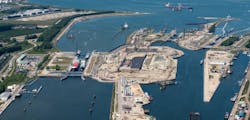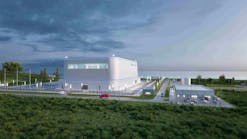Accenture Viewpoint: Creating Opportunity Through Sustainable Investing in Buildings
As the world is becoming increasingly more urban with more than half the world’s population living in cities, buildings where people live and work are major contributors to global emissions. In fact, construction and operation of buildings represent an estimated 38% of global emissions, making the need for solutions to help decarbonize the urban environment more urgent.
Unfortunately, there are significant barriers to investment in net-zero buildings, particularly the availability of financing. The World Green Building Council’s recent Beyond the Business Case report has found that three of the top five most substantial obstacles to investment in sustainable buildings still relate to financing, with more than half (53%) of respondents citing real or perceived higher upfront costs as the biggest barrier to investment.
The World Economic Forum’s new Net-Zero Carbon Cities Building Value Framework seeks to accelerate investment by removing these barriers, in part by recognizing the importance of social and environmental outcomes and system performance in making capital decisions.
At the same time, leaders in the construction, materials and real estate industries are exploring new approaches to decarbonization of new and existing buildings. As results emerge, several key guiding principles have become clear:
1. Decarbonizing technologies work better together rather than separately. Solar and geothermal technologies, for example, can complement each other and add flexibility and system resilience. Technologies such as heat pumps, distributed renewable electricity and storage have a greater impact when they are implemented together rather than individually
2. Digital helps maximize the benefits of decarbonizing technologies. Returns on investments in energy efficiency and on-site renewable generation increase when integrated through digital platforms. Digital enables data-driven management systems across multiple buildings and, in some cases, across an entire municipal system. Digital and data capabilities can augment the impact of low-carbon technology interventions by helping operators make better decisions or through automated controls of building management systems.
3. City ecosystems can contribute to success. Investing in city ecosystem services and equipping buildings with distributed renewable power generation and smart energy management solutions promises to increase resilience and accelerate decarbonization without costly, disruptive grid upgrades. For example, co-siting smart charging for electric vehicles with multi-residence or commercial buildings can provide grid services while contributing to the decarbonization of individual vehicle transportation.
The WEF’s Building Value framework should be used to evaluate both the new construction and retrofit of existing buildings. It can also be used by different types of asset owners across various asset categories and building types. For instance, a social housing agency may prioritize “user satisfaction” and “socio-economic improvement,” whereas a commercial building owner may choose to focus on “systemic value efficiency” to create additional revenue streams from grid services.
Creating a Sustainable State-of-the-Art Office Building
One of the best examples of this value efficiency is the Belgian real estate company Extensa, which converted an old railway station in Brussels into a state-of-the-art mixed-use building. Their aim in this project was to achieve the highest sustainability standards while positioning the building at the heart of an up-and-coming district with a locally self-reliant energy community.
The project included extensively renovating the existing industrial railway station and refurbishing 10,000 square meters in new wood construction. Wood-based construction entails significantly lower embodied carbon than traditional uses of concrete, steel or aluminum. This saved 3,500 tons of CO2 overall. Extensa fitted the development with 10,000 solar PV panels, 10 geothermal energy wells, two 1,300 square meter rainwater-collection tanks and 3,000 square meters of indoor gardens.
When deployed individually, each of these investments can lower carbon emissions. However, the benefits of each are multiplied when complementary technologies are deployed together. For example, the combined applications of rainwater harvesting and cultivating indoor green space create a closed-loop system for irrigation that minimizes water consumption and water waste while enhancing user satisfaction by providing a pleasant environment for tenants.
Next Steps Toward Building Value
Builders, real estate developers, building operators and other participants in the urban ecosystem can play a major role in decarbonizing the environment. The World Economic Forum has developed a checklist of next steps for action in this area:
· Make use of distributed power generation and solar
· Install active and passive energy efficiency technology
· Design to support the grid and local energy communities
· Contribute to clean mobility by installing smart electric vehicle charging
· Monitor energy consumption
· Design for the connectivity and interoperability of deployed assets
· Optimize energy use with building management systems
· Optimize life cycle efficiency with building information modelling
The need to move the world’s cities towards a net-zero carbon future is clear. Using the Building Value framework, participants can make investments within an integrated approach to delivering a more sustainable urban built environment.
- - - - -
Sanda Tuzlic is a Managing Director at Accenture where she leads Accenture’s Net Zero Connected Energy Business globally which focuses on helping clients bring net-zero energy solutions at scale in the area of eMobility, decentralized energy resources, energy efficiency and flexibility services. With 15 years of experience serving utilities companies across Europe, Sanda has developed excellent industry acumen, especially in the context of energy transition, eMobility, market reform and digital transformation.
-- -- --
Accenture is a global professional services company with leading capabilities in digital, cloud and security. The company name is derived from the term "accent on the future."






